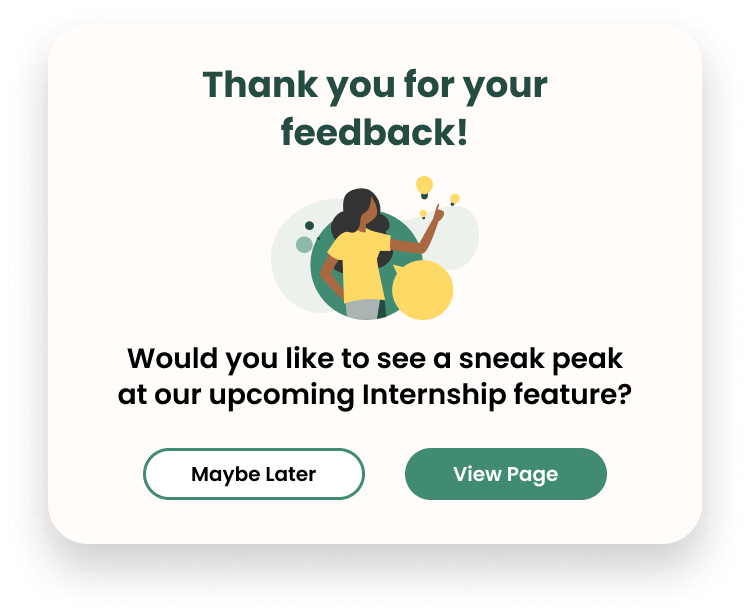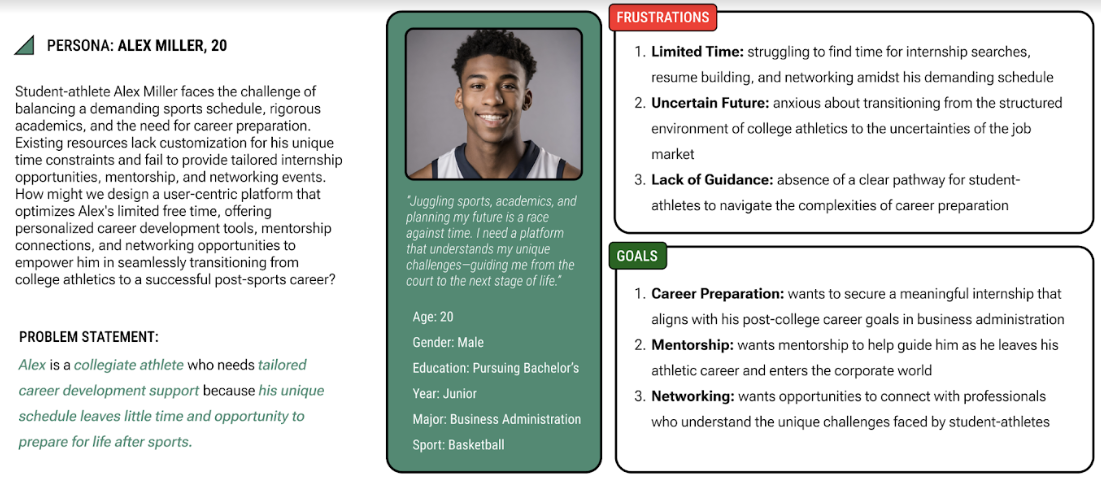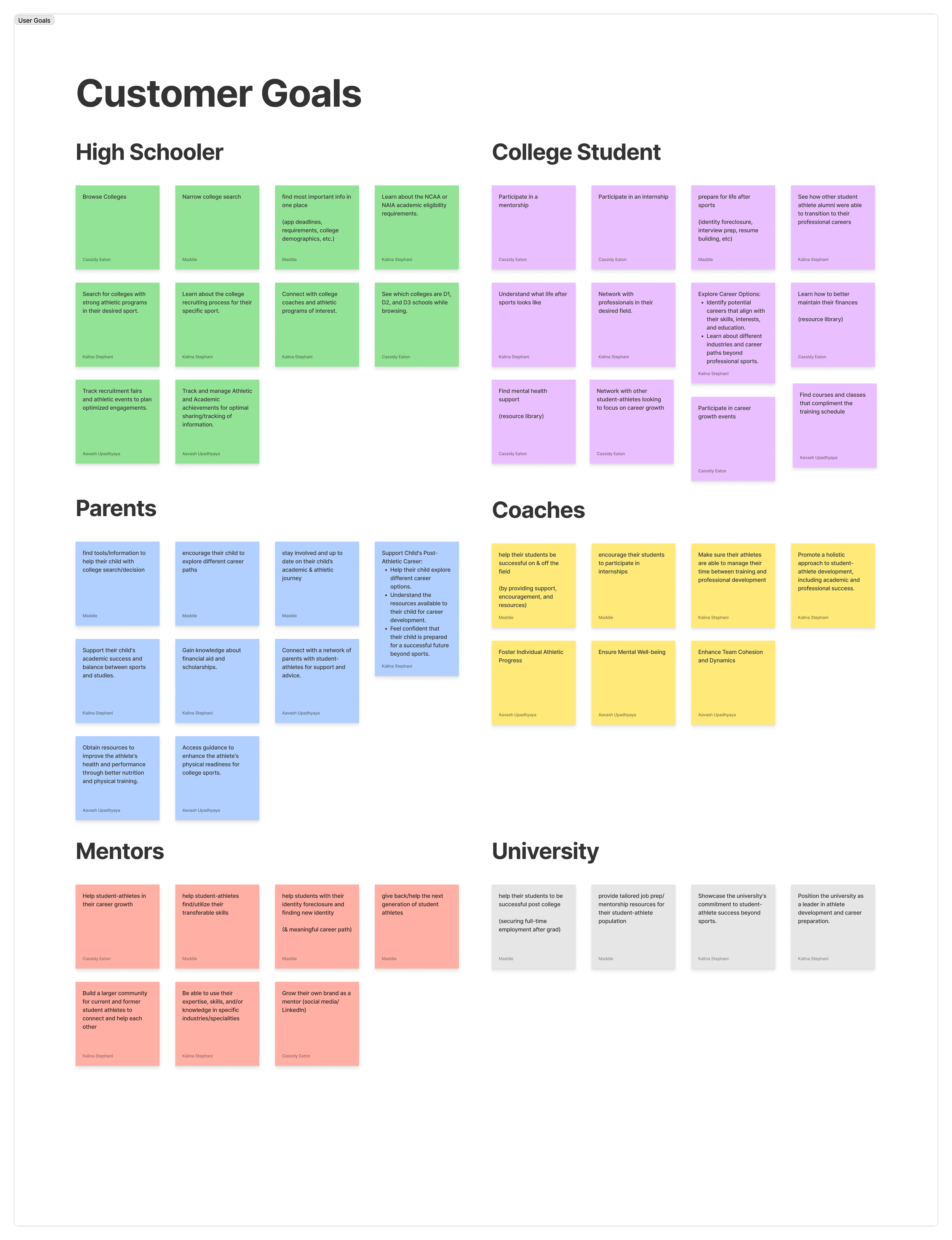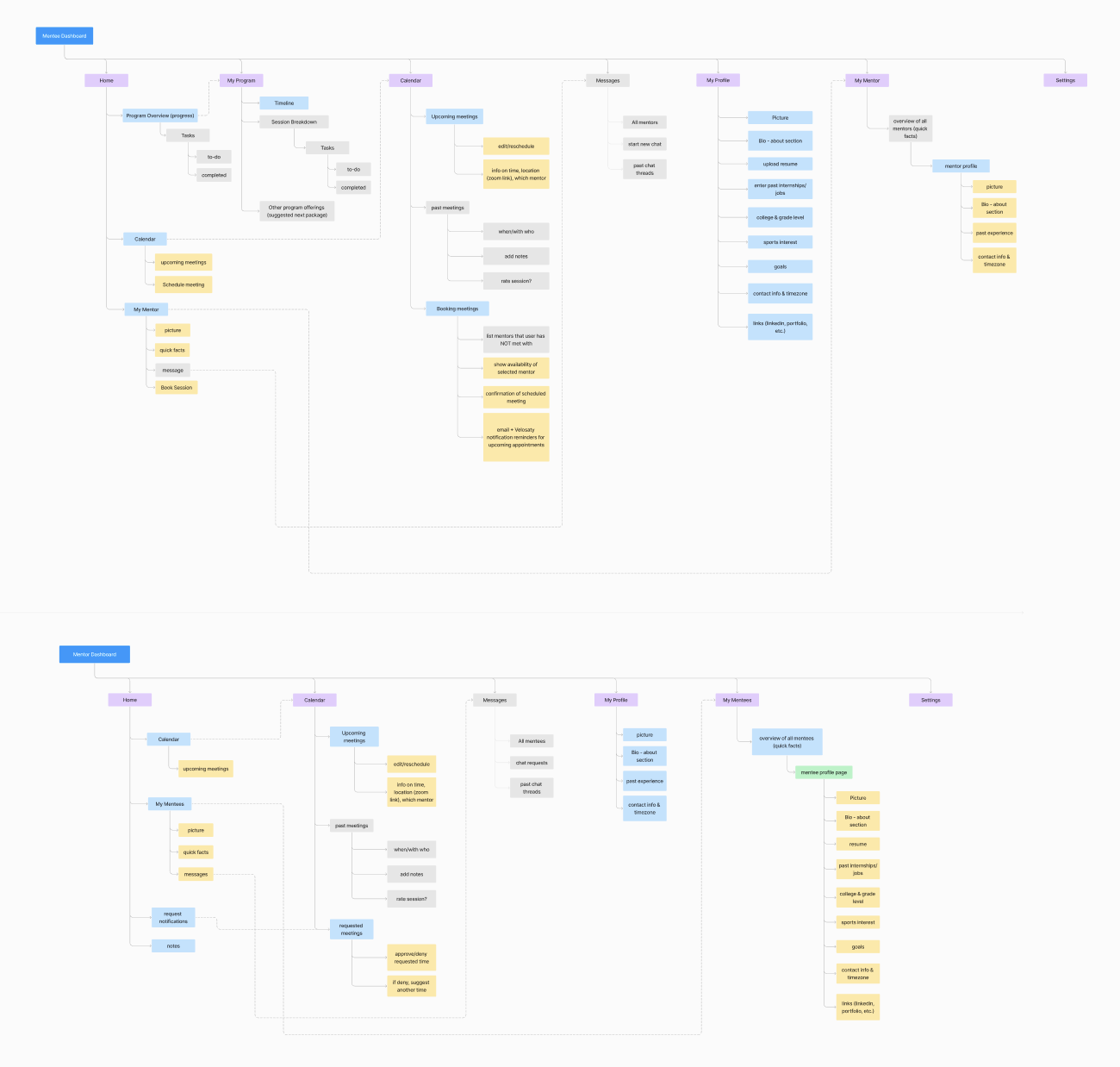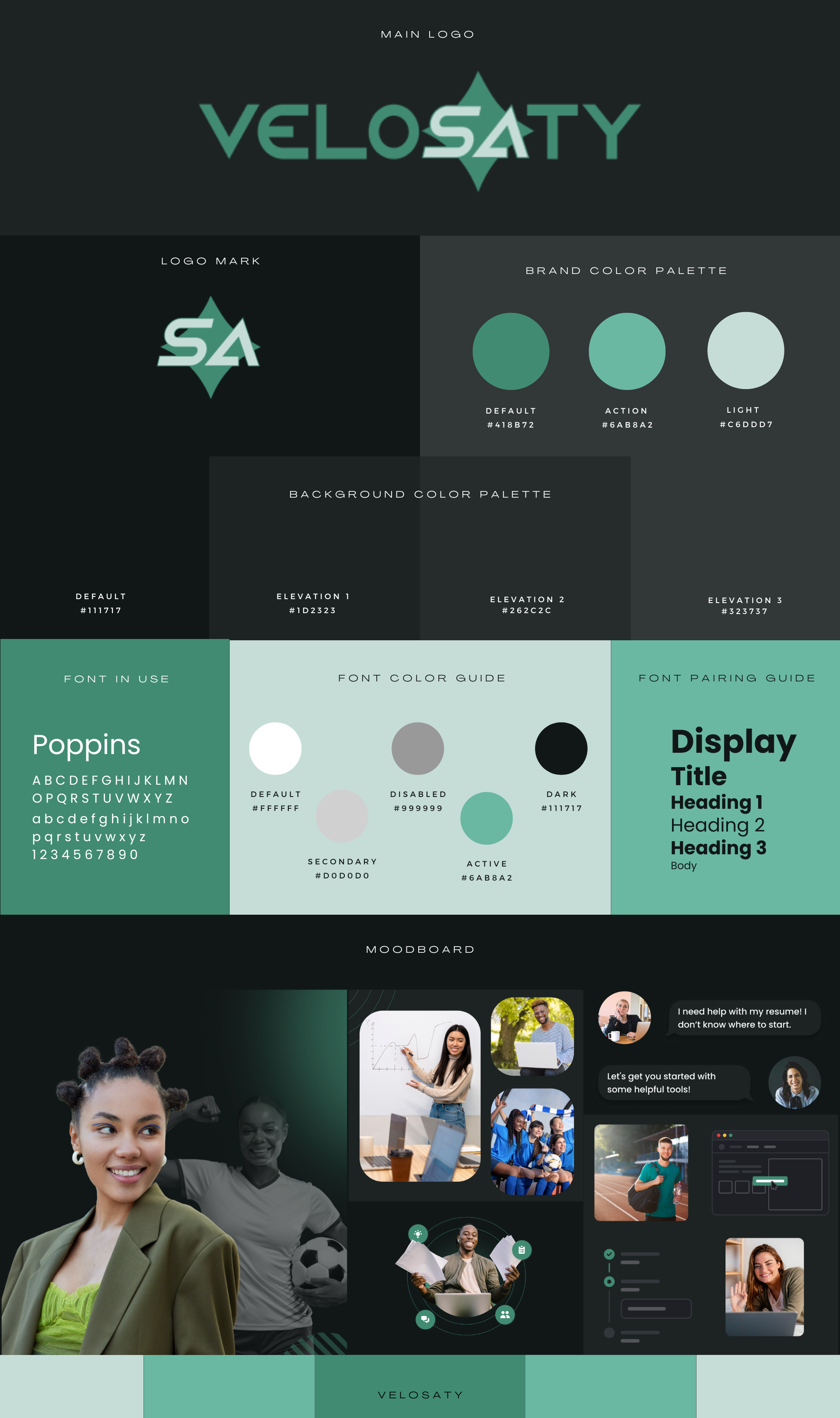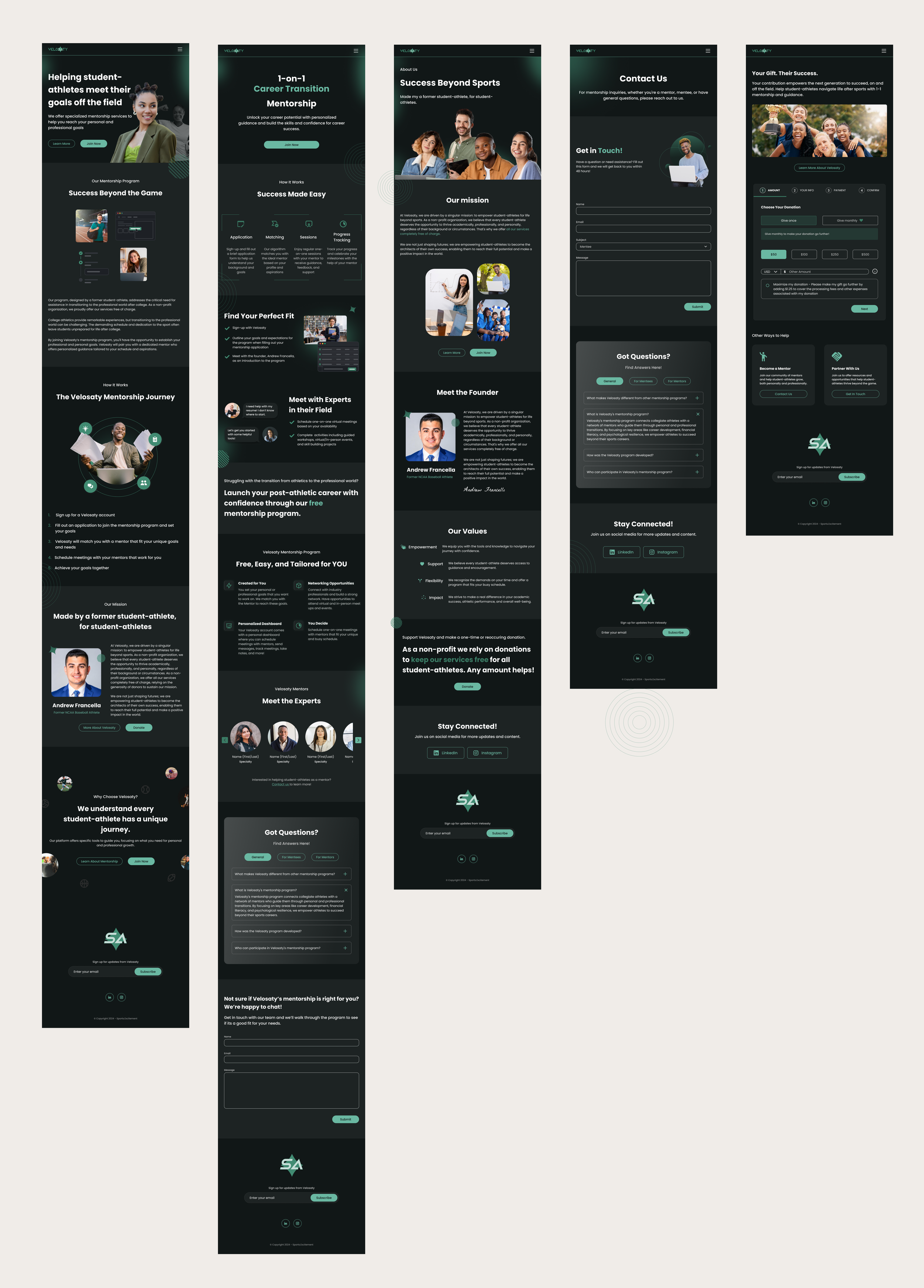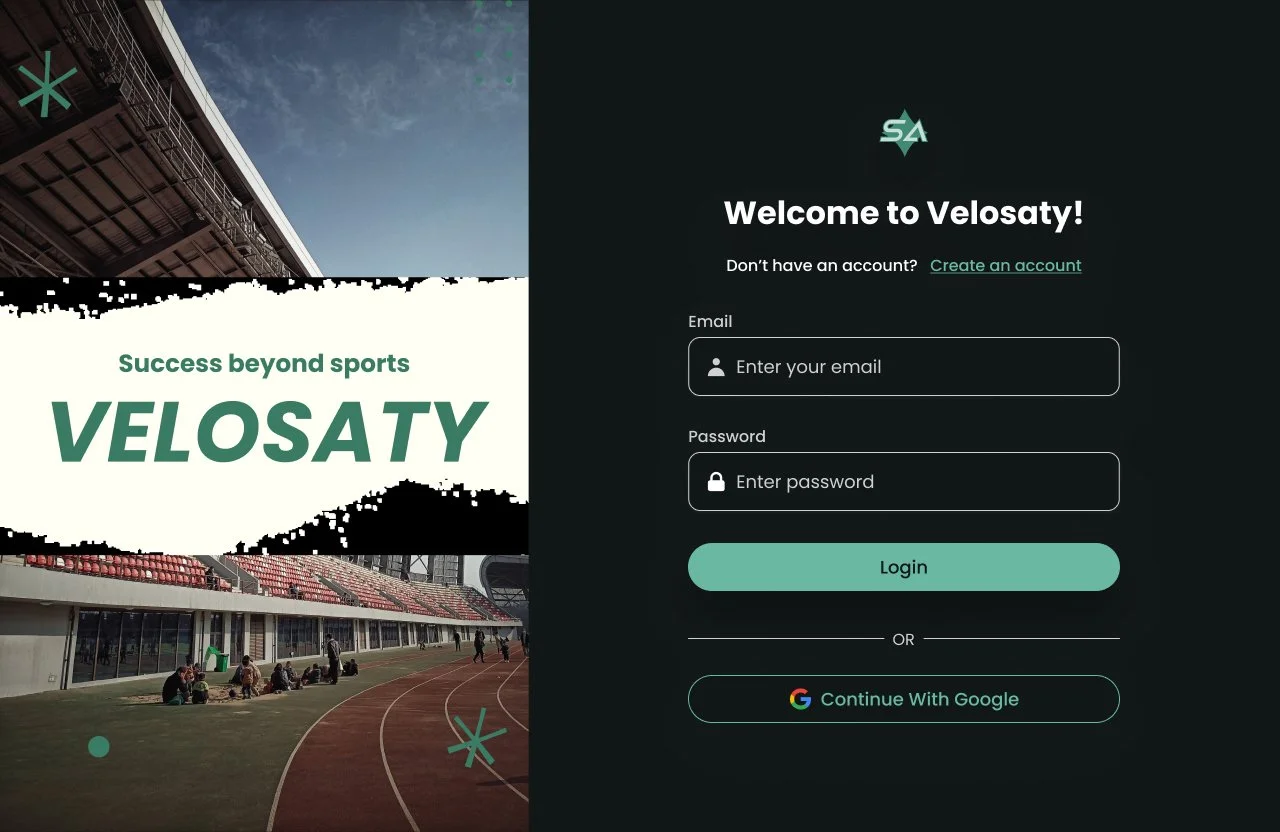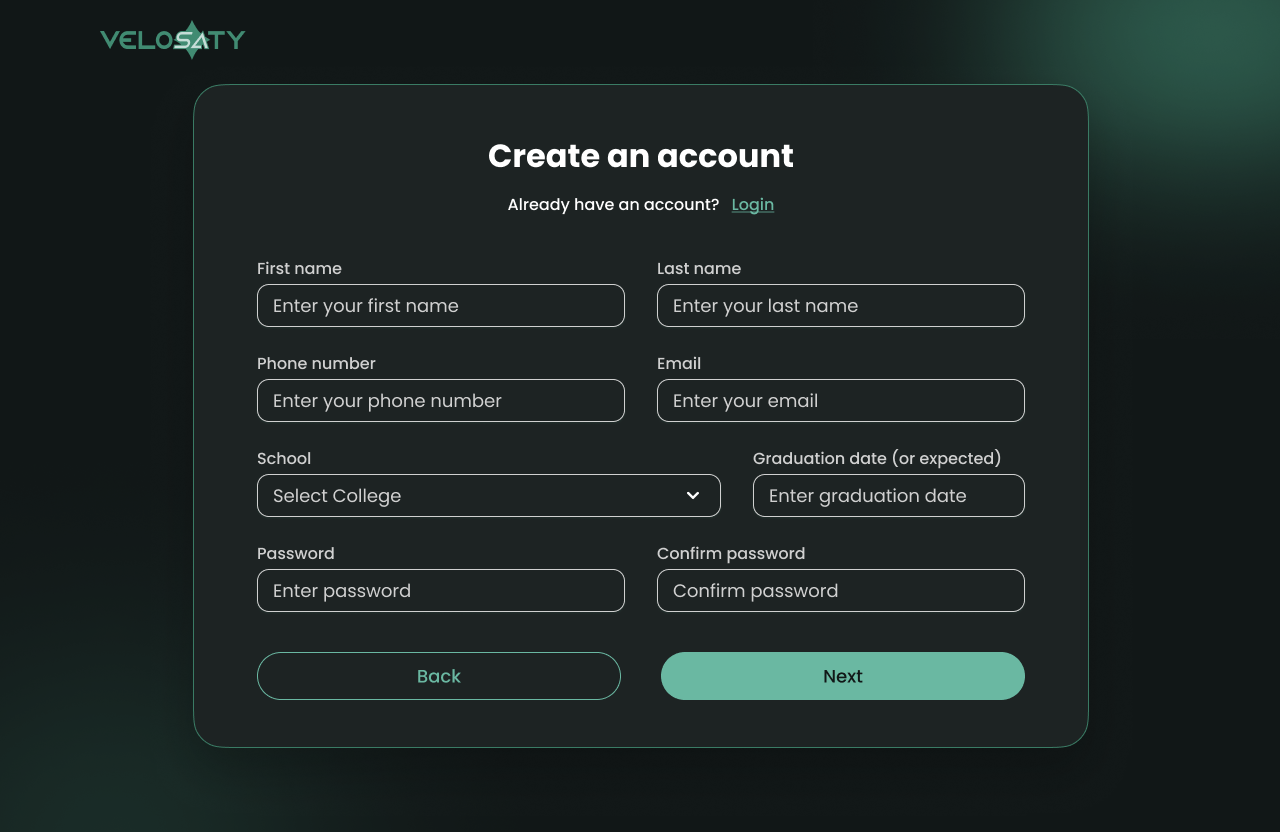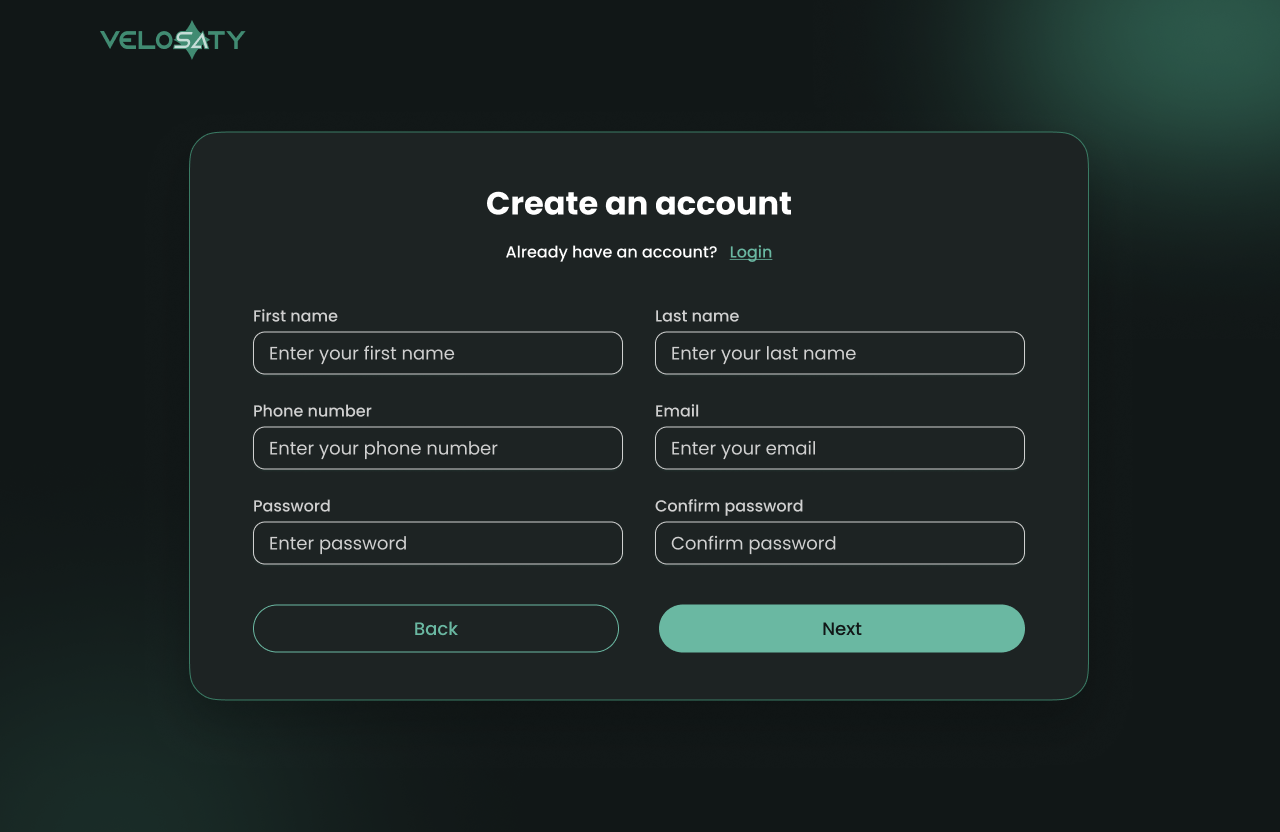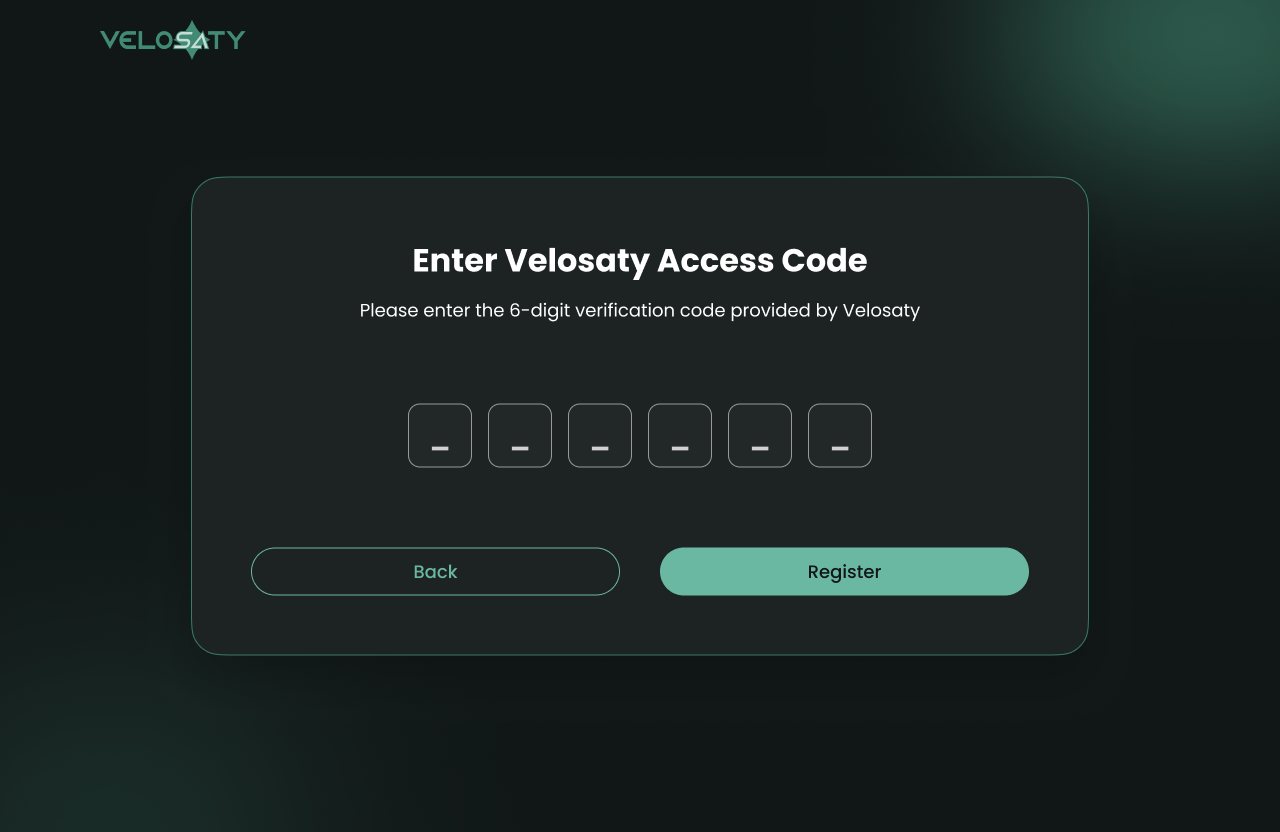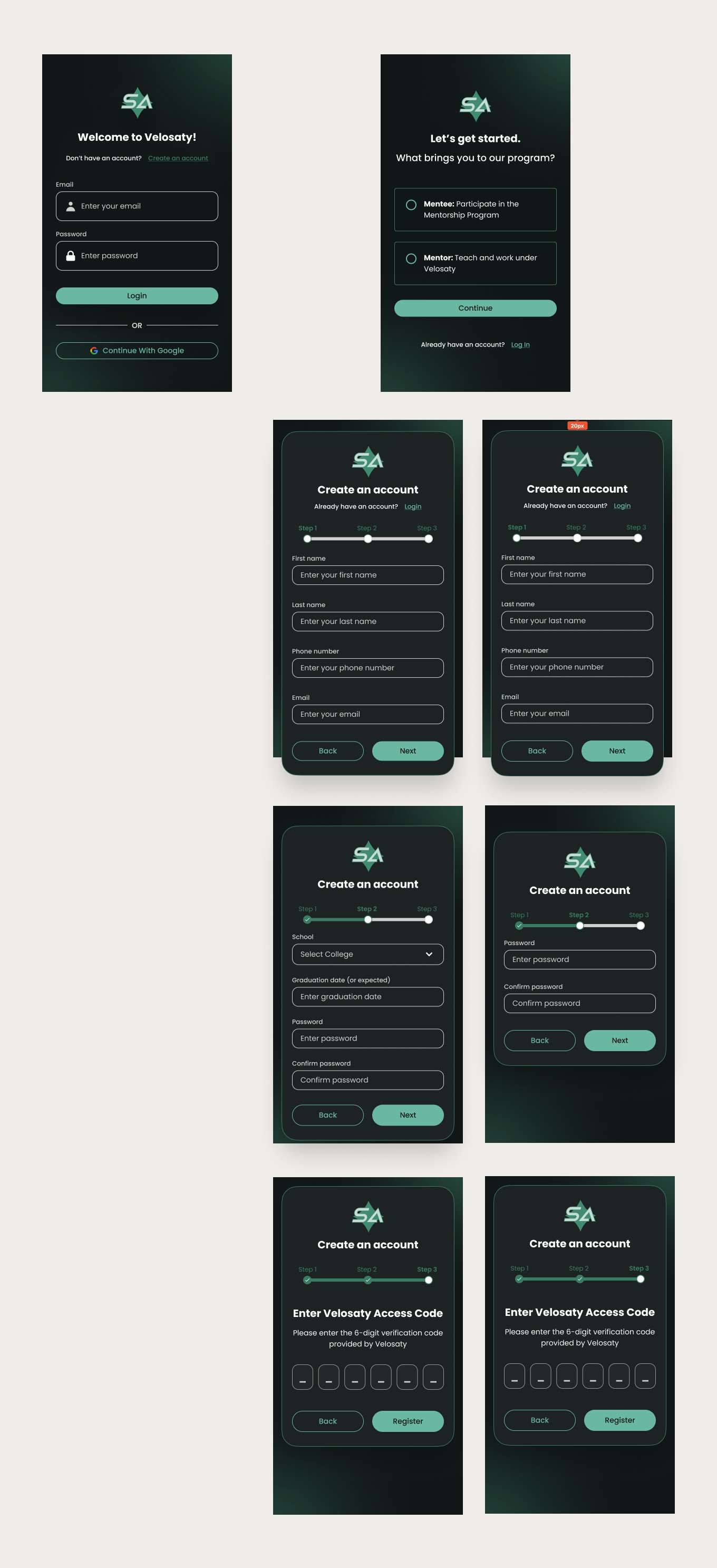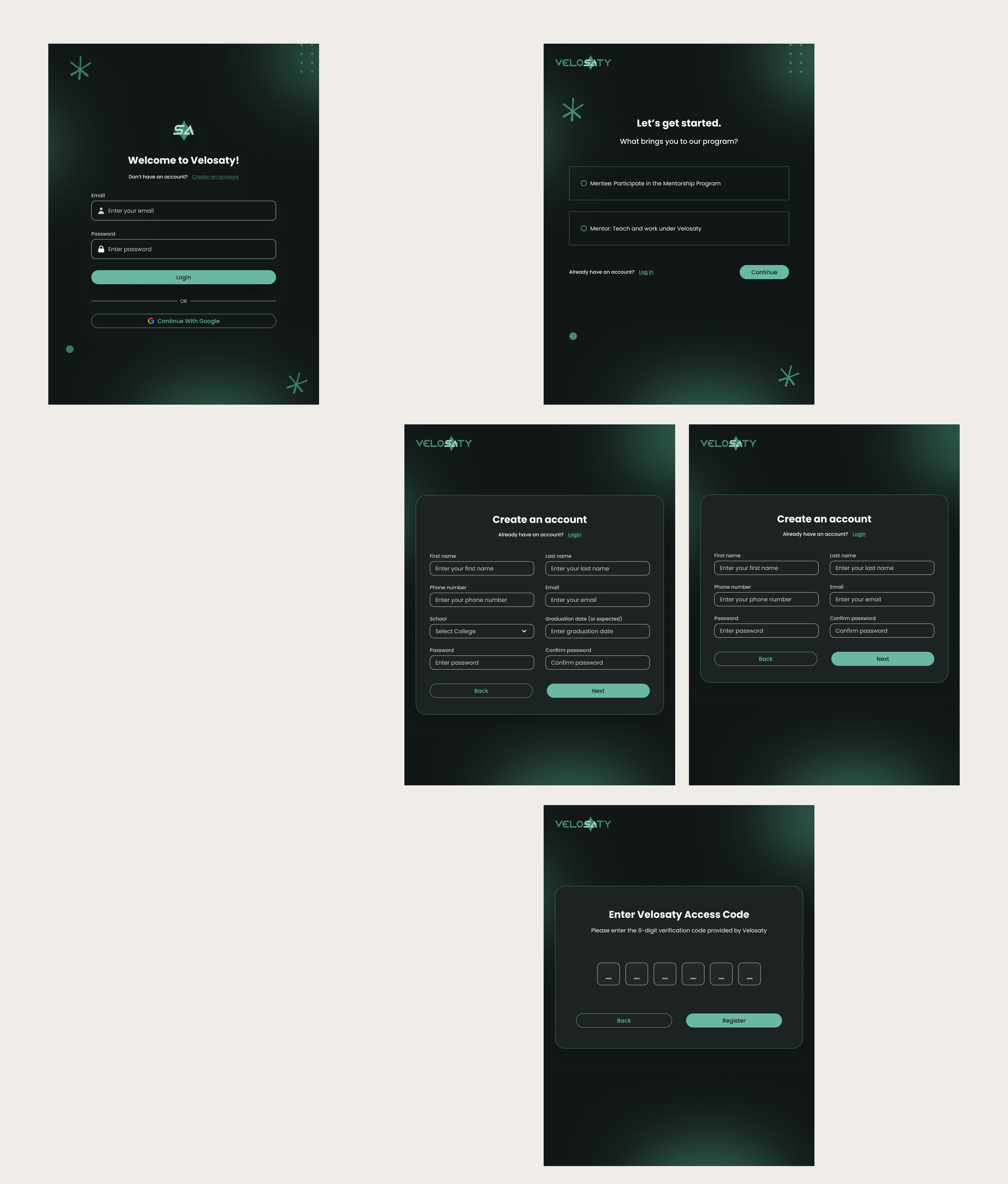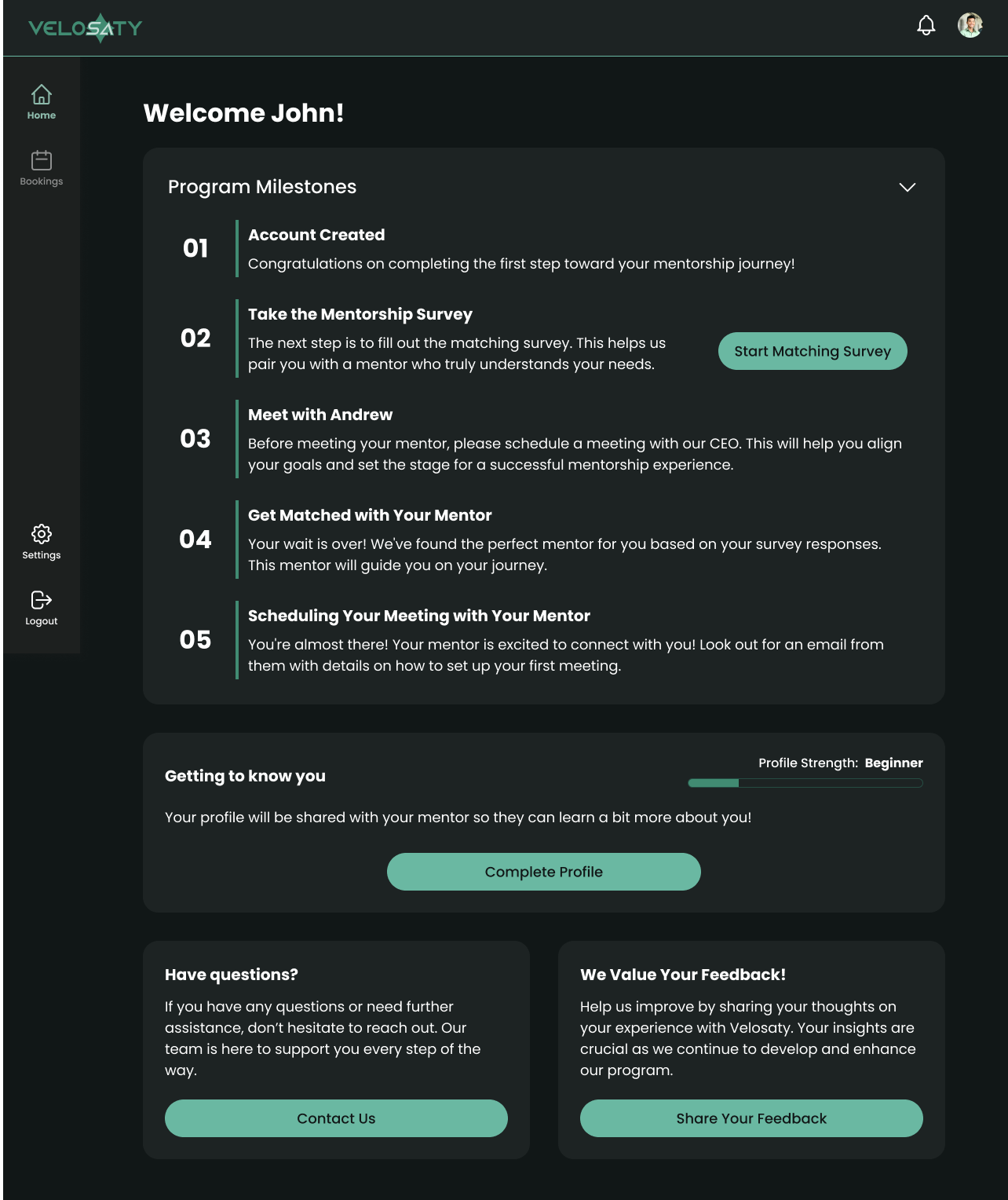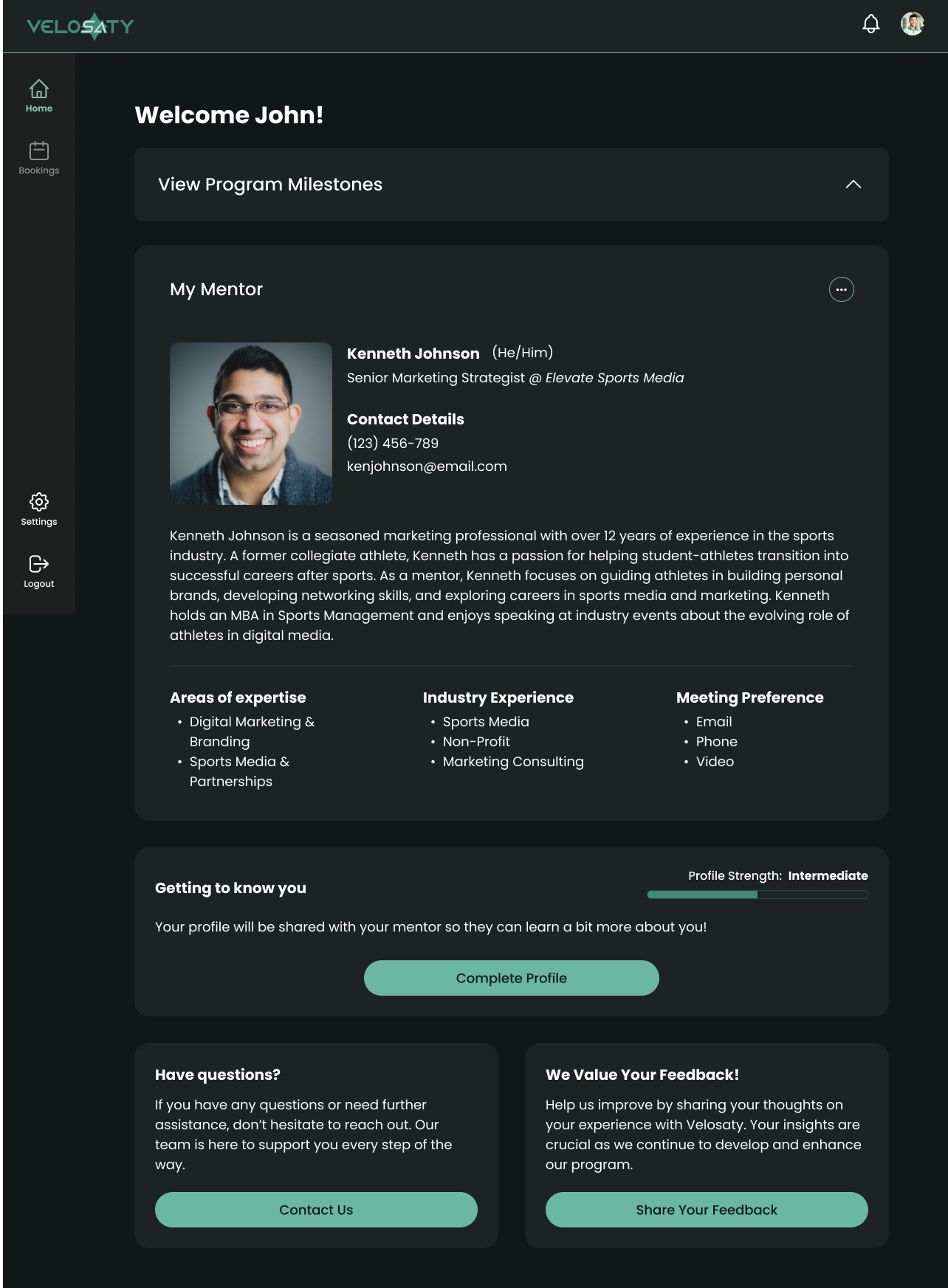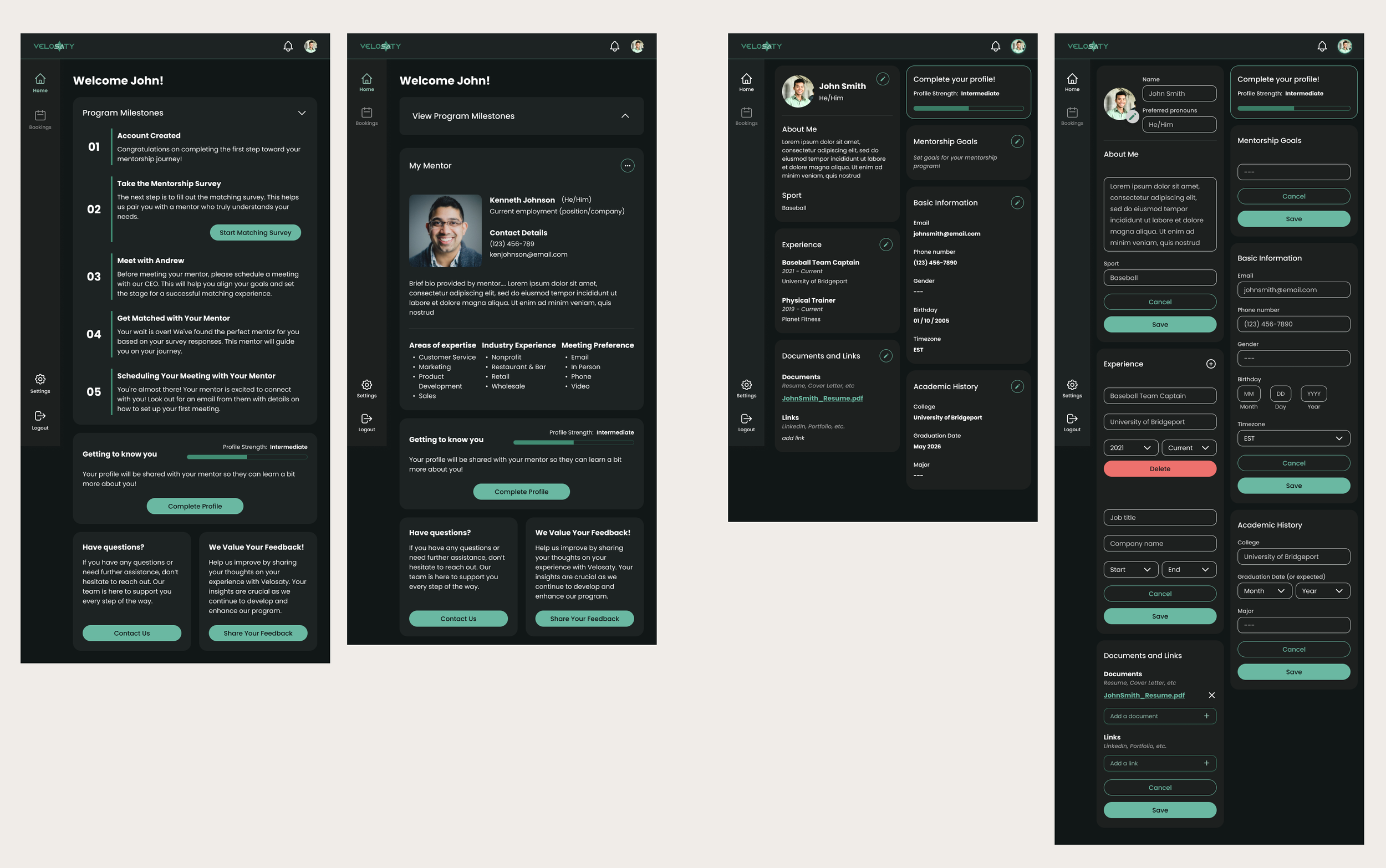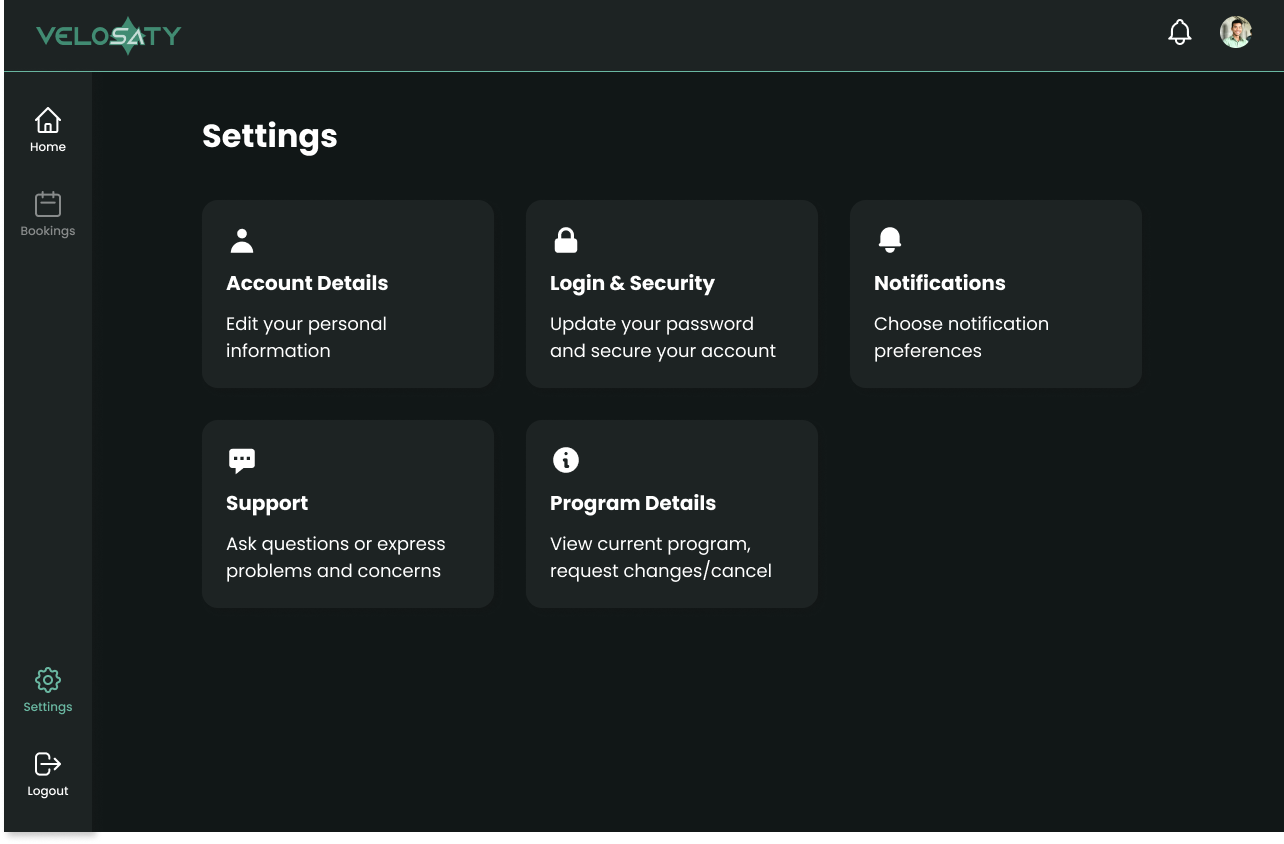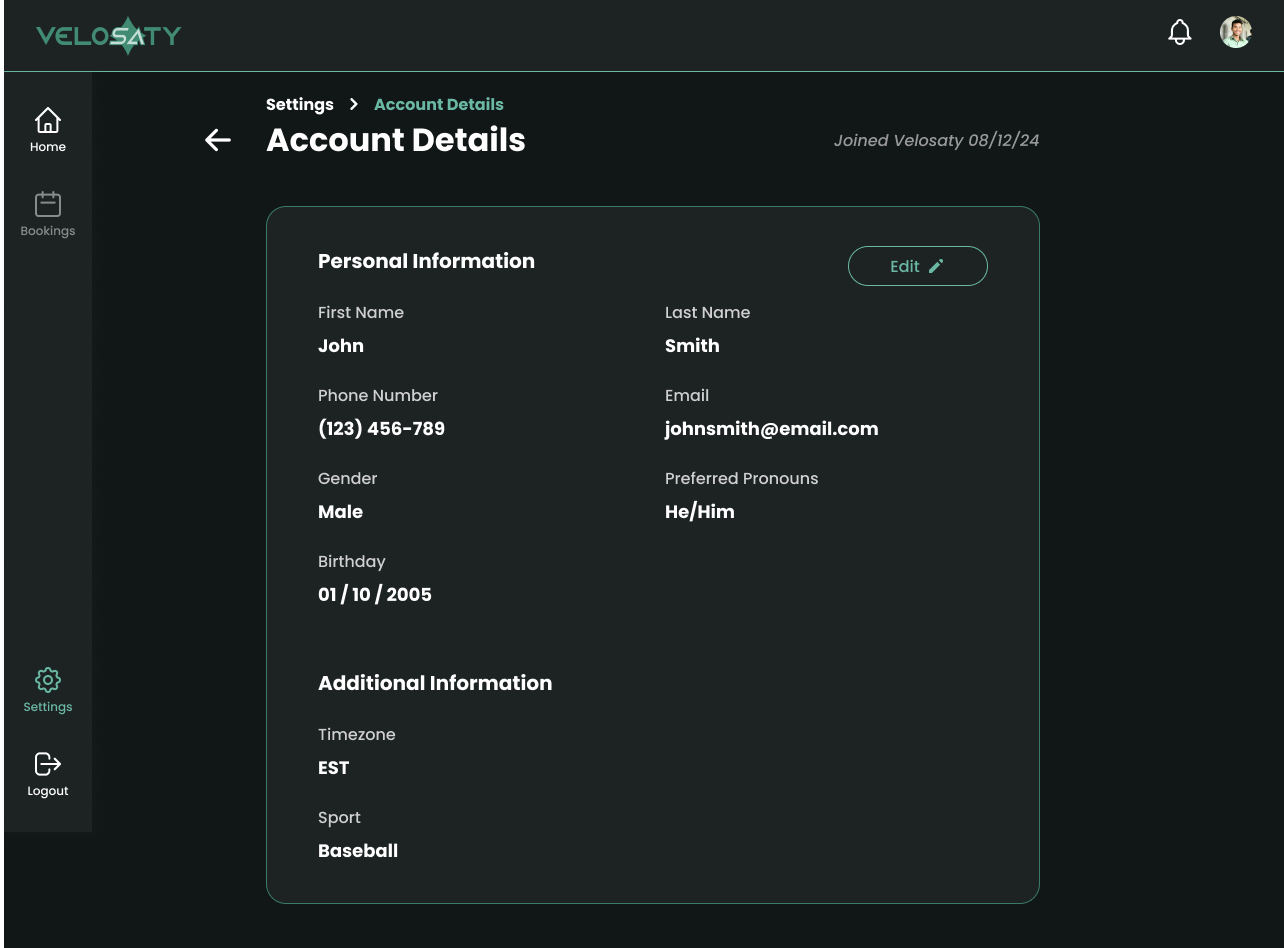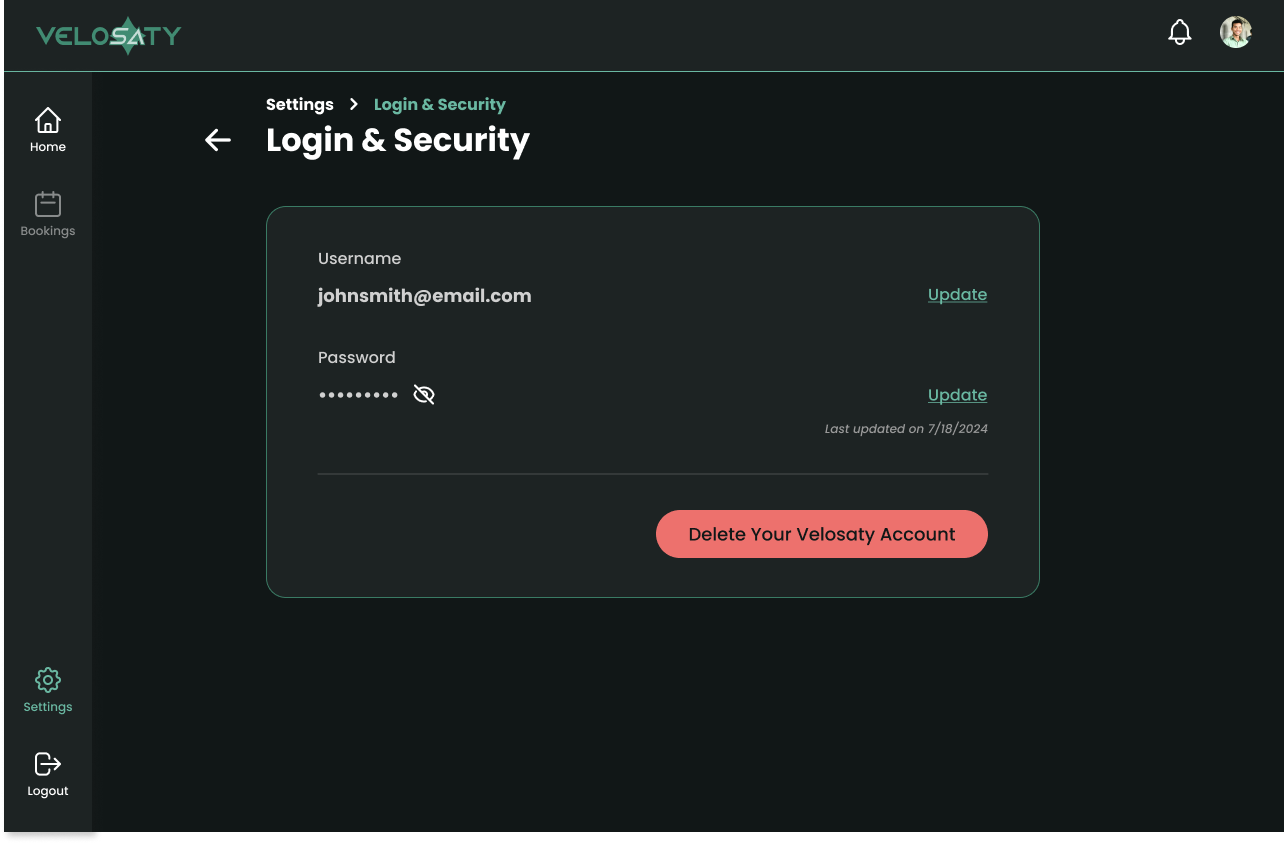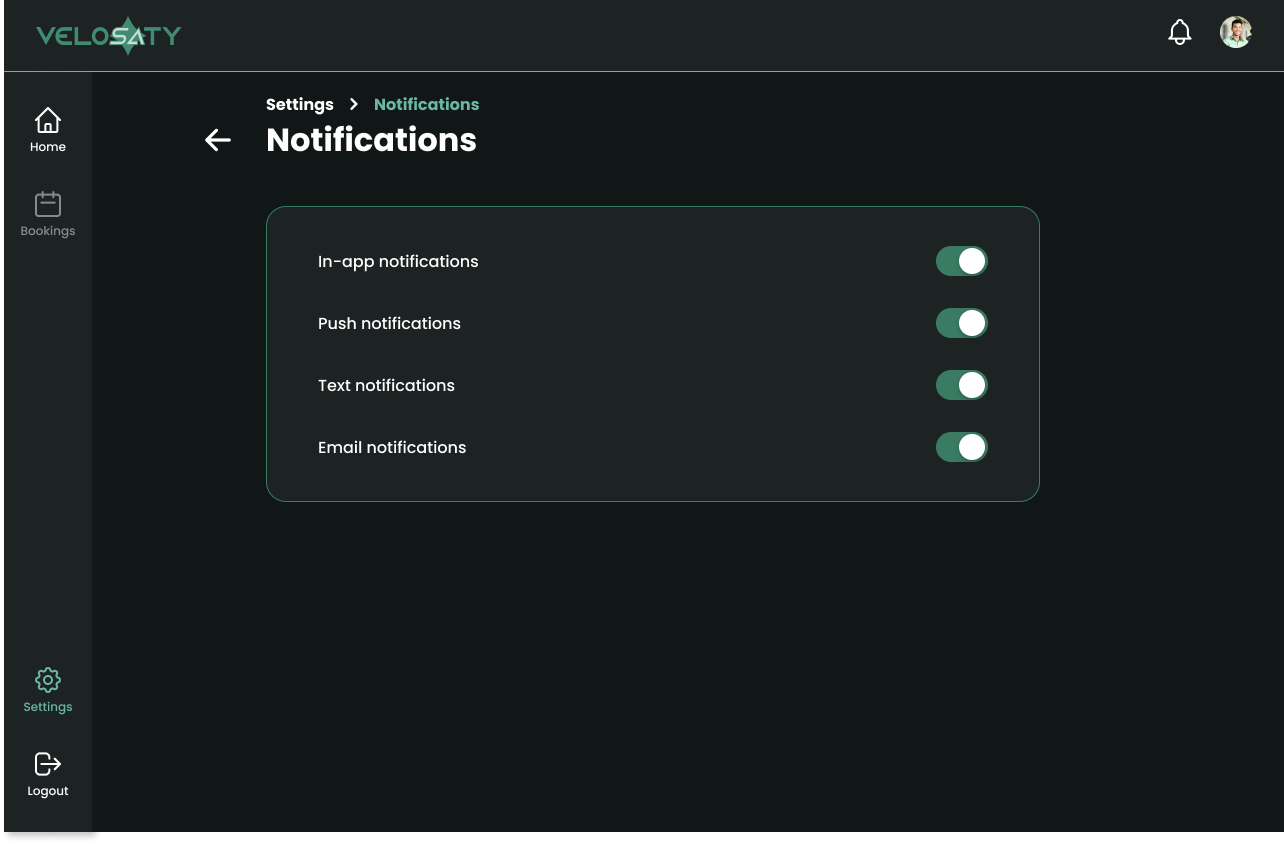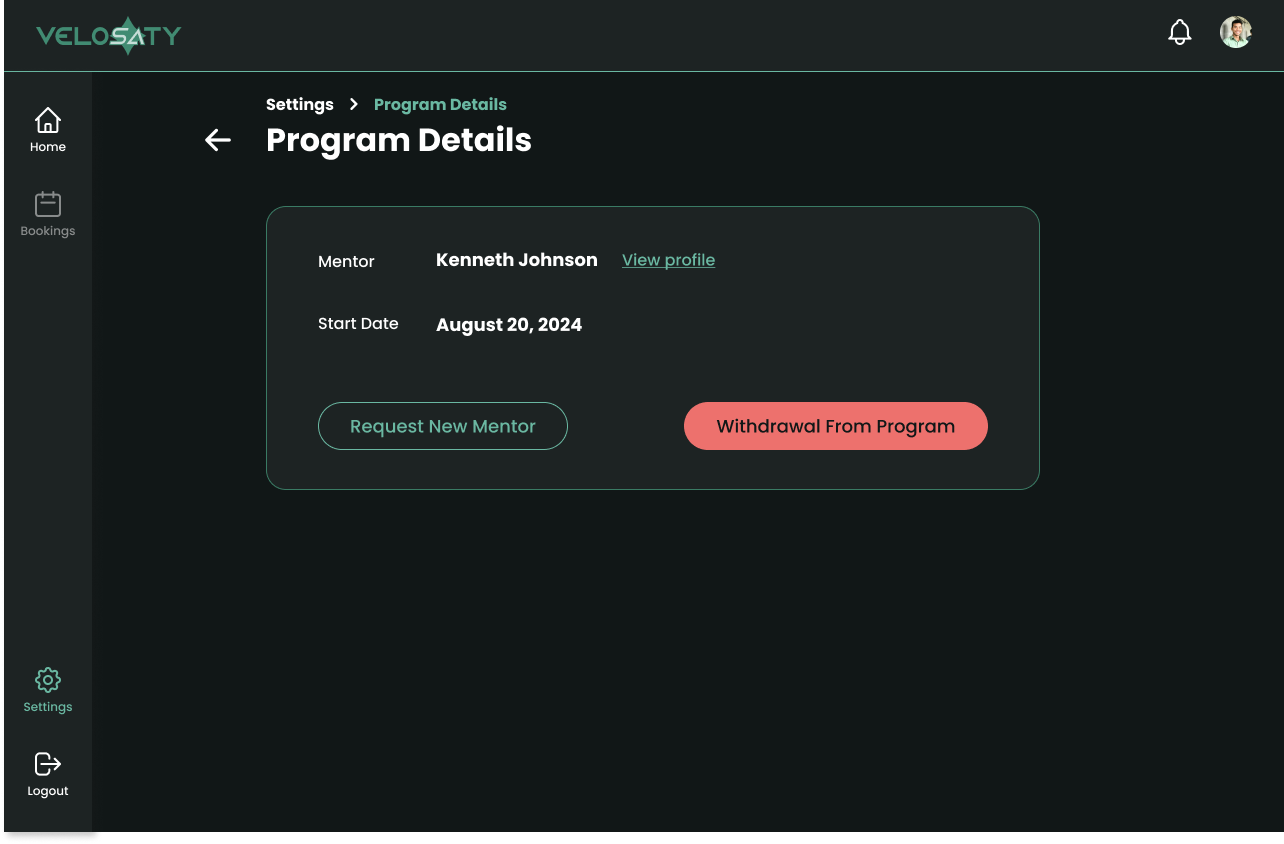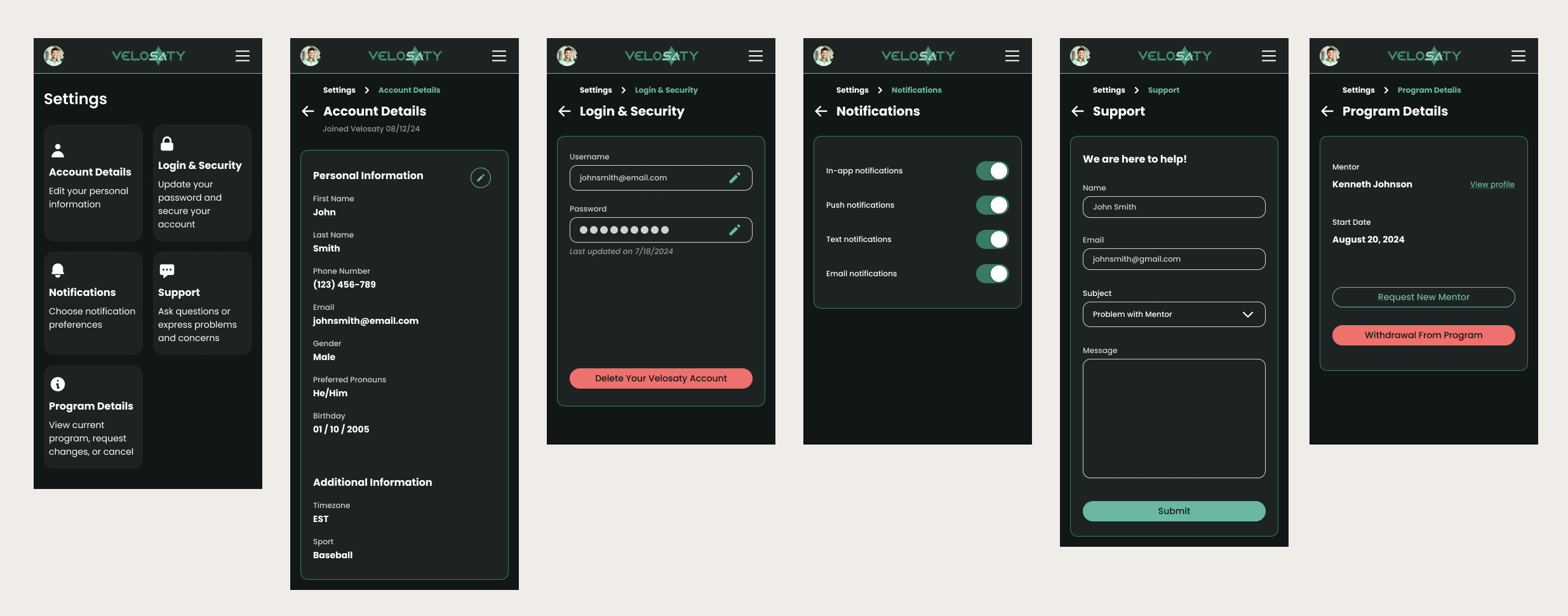Velosaty Mentorship: Built to Inspire Student-Athletes
TIMELINE
December 2023 - Present
MY ROLL
UX Designer and Researcher at Velosaty
4 Person Team
SOFTWARE USED
Figma/ FigJam
Google Forms/ Sheets
SUMMARY
Velosaty’s mission is to ensure that every student-athlete we work with feels equipped, confident, and ready to take on their university years and beyond. The UX Design and Research team at Velosaty was tasked with understanding and designing a mentorship program feature for the website. Our team conducted literature reviews, user interviews, surveys, audited other mentorship programs, and market research to gain a solid foundation. We then moved on to finalizing the core functionality of Velosaty’s mentorship feature and all the features we wanted to offer our users, creating user goals/stories, journey maps, activity diagrams, and a site map. The team and I have since handed off our MVP designs to development and are working on our next feature!
PURPOSE
Conduct research to understand the efficacy of mentorship programs for student-athletes, what students and mentors want/need, and how to foster meaningful connections. The final design streamlines mentor-mentee interactions, providing a structured, impactful support system for athletes as they navigate their university years and beyond.
RESEARCH METHODS
Literature review - reviewed previous research on the efficacy of mentorship programs on student-athletes.
User interviews - conducted 12 interviews with student-athletes as well as former/current mentors & mentees.
Surveys - designed a preview page on the upcoming mentorship feature with a survey to gauge interest and what features student-athletes were interested in seeing.
Audits - audited other mentorship programs to understand offerings and view other sitemaps.
Market research - better understand the needs and usability of this mentorship service and what segment of the market we should target.
LITERATURE REVIEW - CAREER FOCUSED MENTORSHIP PROGRAM
-
The Learning Theory of Career Counseling (LTCC)
Based on Krumboltz's social learning theory, focuses on helping individuals acquire new skills, interests, beliefs, and values (emphasizes the role of learning experiences in shaping career paths)
Psychosocial Mentoring vs Career-focused Mentoring
Peer Mentoring
E-mentoring
Constellation Mentoring
-
Exploring different career options & gaining a more realistic view of the job market
Increased job search self-efficacy
Higher levels of confidence in various job search activities - applying for jobs, networking, & interviewing
Provided a safe place for student athletes to seek personal insight, clarify career goals, and receive objective guidance, facilitating their transition into productive members of society
The social support aspect of the mentor-mentee relationship was highly rewarding for student athletes, offering them someone to talk to and helping them develop future career goal
Mentoring programs provide athletes an opportunity to learn about areas of interest not offered in high school curriculum to work with professionals in the community and to learn about education and career options and make decision regarding these options
-
Early intervention
First and second-year student-athletes should explore academic and career interests to gain control over their inevitable transition (the earlier the better)
Matching process
EX: Survey, assessment, choice-based, practitioner-assigned
Properly matching mentors and mentees played a crucial role in the success of the mentoring experience (ex. Gender or race-based)
Incorporating practical activities
Career exploration activities
Internships, job shadowing
Career development activities
Resume writing, mock interviewing,crafting elevator pitches, job search strategies
Life Skills
Financial literacy
Guest speakers
Emphasize the value of transferable skills
Teamwork, cooperation, focus, discipline, & time management
Regular feedback (program maintenance)
EX: Survey
Commitment
Signed contracts and/or various accountability measures
Orientation to share objectives, expectations and norms
-
Relationship building was identified as a significant factor contributing to the success of mentor-mentee relationships
Both mentors and mentees should commit to a long-term relationship, and training should cover various topics to help establish a strong mentor-mentee bond
-
Genealogy: Mentors should talk about their own mentors and their mentors' mentors, so students and others will understand how they fit (belong) within the long history of the discipline.
Mentors act as benefactors, counselor, supportive friend and role model
Mentor success is conducive to long-term mentee success
Mentors need training on mentoring
Mentors must meet program’s minimum qualifications to act as a mentor
-
Beck, L. (1989). Mentorships: Benefits and Effects on Career Development. Gifted Child Quarterly, 33(1), 22-28.
Bjornsen, A. L., & Dinkel, D. M. (2017). Transition experiences of division-1 college student-athletes: Coach perspectives. Journal of Sport Behavior, 40(3), 245-268.
Coffin, K., Stokowski, S., Paule-Koba, A., & Godfrey, M. (2021).“I Have Grown”: A Case Study of Student-Athlete Career Development at Clemson University. Sports Innovation Journal, 2, 56-72.
Curry, L. (2010). The impact of a mentorship program on the academic and personal development of college athletes. ProQuest Dissertations Publishing.
Fraina, M., & Hodge, S. (2020). Mentoring relationships among athletes, coaches, and athletic administrators: A literature review. Journal For The Study Of Sports And Athletes In Education, 14(2), 140-164.
Girves, J. E., Zepeda, Y., & Gwathmey, J. K. (2005). Mentoring in a Post-Affirmative Action World. Journal of Social Issues, 61(3), 449–479.
Hallmann, K., Breuer, C., Ilgner, M., & Rossi, L. (2020). Preparing elite athletes for the career after the career: the functions of mentoring programmes. Sport in Society, 23(7), 1217-1234.
Hamilton, L. K., Boman, J., Rubin, H., & Sahota, B. K. (2019). Examining the impact of a university mentorship program on student outcomes. International Journal of Mentoring and Coaching in Education, 8(1), 19-36.
Hill, S., & Bahniuk, M. (1998). Promoting career success through mentoring. Review of Business, 19(3), 4-7.
Hoffmann, M.D., (2019). Considerations for facilitating the development of peer mentoring relationships between athletes. Journal of Sport Psychology In Action, 10 (1), 59-72.
Navarro, K., & Malvaso, S. (2015). Toward an understanding of best practices in student-athlete leadership development programs: Student-athlete perceptions and gender differences. Journal of Applied Sport Management, 7(3), 23-43.
Navarro, K., & McCormick, H. (2017). Outcomes-Based Career Preparation Programs for Contemporary Student-Athletes. Journal of Applied Sport Management, 9(1), 135-158.
Rickel, E. A., Derby, J. L., & Chaparro, B. S. (2022). Using Peer Mentorship to Foster Growth and Interest in Human Factors. Ergonomics in Design.
Sanders, E.J. (1992). Implementing A Career Development Program For Student Athletes. The Academic Athletic Journal, 7(2), 24-29.
USER INTERVIEWS
12 student-athletes who participated in a mentorship program as a mentee or mentor were asked various questions about their personal background, mentorship program experience, and for mentorship program feedback.
Findings:
Have clear expectations and communication
Flexibility is Key
Offer Career Focus & Mental Health Support
Qualities of a Good Mentor
Face-to-Face Interaction is Vital
SURVEY
An introduction into the mentorship feature was designed and added to the Velosaty site with a survey to gauge interest. Screens for desktop, tablet, and mobile are shown below.
XXL Screen - Desktop
XL Screen - Desktop
Md Screen - Tablet
Sm Screen - Mobile
Once the user completes the survey about the mentorship page they receive a pop-up modal asking if they’d like to see the other feature we are working on - an internship feature.
XXL Screen - Desktop
XL Screen - Desktop
Md Screen - Tablet
Sm Screen - Mobile
Survey Results: Great feedback showing interest in the mentorship program and the features we are planning to offer.
MARKET RESEARCH
Research showed us certain areas that likely indicate student-athletes will a likelihood of higher support needs for schooling and career development. These identifiers include:
Other key identifiers:
Low socioeconomic status
Intent as an athlete? (Someone that is an athlete for scholarship/plans on normal career after vs. athlete that plans on going pro)
Geographic location
Typically Basketball, Football, and Soccer that see more individuals of low socioeconomic status as these sports are typically low-cost to play.
Schools to focus on:
Student-athletes at Division 2 and 3 schools
Schools with low grad rate
Schools with low job rates after graduation
Why Division 2 and 3 Schools?
Division 1 (D1) typically has better competition, scholarships, and overall better support. We want to focus on D2 and D3 schools so their student-athletes can access support for their academic and career growth. Velosaty’s Mentorship program will help pair athletes with mentors and provide access to a free library of resources on a variety of topics from study tips, resume building, mental health, and much more. These features and resources are seen less often at D2 and D3 schools and result in student-athletes struggling to find careers after college.
Why focus on student-athletes with low socioeconomic status?
These student-athletes are likely the ones with the least amount of support in school and career development. This may be from a lack of program support options or a lack of awareness of these topics. Additionally, student-athletes of low socioeconomic status are typically seen to have weaker skills in areas like finance, career planning, and more. Turning to focus more on this group of individuals will help Velosaty find the student-athletes who need this help the most.
USER PERSONA
MENTORSHIP PROGRAM AUDITS
This audit focused on competitors and other popular mentorship programs. We looked at the following areas:
-
Competitor Type (direct or indirect)
Primary Market Segments
Product Offering
Pricing Strategy
Website URL
Unique Value Proposition
-
Interaction
Features
UX/UI
Visual Design
Brand Identity
Tone
-
Revenue Streams
Partnerships
-
Customer Reviews
Strengths/Weaknesses
Gaps
Competitor Audits - analyzing mentorship programs tailored toward schooling and career development of students and student-athletes in high school and college. Click the link below to open a pdf file of the document.
Popular Mentorship Program Audits - analyzing mentorship programs tailored toward career development. Click the link below to open a pdf file of the document.
AUDIT FINDINGS
Pricing:
Per hour
Monthly
Subscription-based
Mentors:
Pricing
Mentors set their own pricing
The site sets a subscription price
Offerings
Voice Calls
Video Calls
Messages
Other: Resume review, etc.
Aspiring mentors can submit a form to be reviewed and either accepted or rejected
Site offerings:
Mentorship search/filter
Free trials (7-day)
Work with multiple mentors vs 1
Extras offered by site:
In-person meet-ups
Lectures/talks by professionals
Messaging service
Calendar
Meeting reminder services
MONETIZATION FOR MENTORSHIP PROGRAM
Partner Research:
Partnering with schools bc schools allocate money for programs like this
Donors of large institutions (parents, coaches = passionate about supporting athletes)
Nonprofits can be a good resource and may partner with platforms/people to distribute money to
Licensing (ex: formal mentorship program)
RESEARCH CONCLUSIONS
Effective mentorship enhances career exploration, skill development, and confidence in students, particularly benefiting student-athletes.
Mentorship Recommendations:
Enhanced Mentor Training
Clear Program Communication
Tailored Program Content
Regular Program Evaluation
Additional Program Features:
Mental Health Resources
Community Building
In-person and virtual meetups
Talks by professionals
These research conclusions led us to clarify some questions about how Velosaty’s mentorship program will work. Our team worked closely with the company’s owner to ensure his vision is met and came to the following conclusions.
-
Pricing Structure:
Determine pricing strategy:
Free
Consider the incentive for mentors with no payment - Would mentors offer their services for free? How to find mentors willing to do a free service? What would the quality be like?
Per hour
Probably the best option
Monthly
Likely not the best choice for college students
Subscription-based
Likely not the best choice for college students
Mentor pricing
Can mentors set their own pricing?
Yes
Consider: How to handle excessive pricing? Have pickable price options? A max price?
No
Consider: How mentors would feel about having no say in their prices? Would their offerings change to fit the fixed cost/free service?
Can mentors adjust their pricing?
If yes - How often can they adjust their pricing?
Anytime? Once a month?
What happens to previous mentees if a mentor increases their pricing?
Mentees must accept the price increase or their next payment is automatically canceled (monthly pricing structure).
Past mentees keep whatever pricing amount it was when they signed up regardless of any increases.
Mentees
(If there is a cost) Offering mentees some kind of free trial/1 call to meet with their mentor and make sure they mesh well together
(If there is a cost) Can student-athletes apply for a fee waiver?
What would this include?
How does this impact mentors if there is a cost?
(If there is no cost) How to encourage/incentivize mentees to keep working with mentors?
Any check-in messages if they miss meetings or don’t utilize the service?
Mentors:
Offerings
Will there be a standard of offerings that mentors should have?
Voice Calls
Video Calls
Messages
Other: Resume review, etc.
If there is no standard, how will mentorships be kept in check for quality offerings?
How often can offerings be edited?
Anytime? Once a month?
Mentor vetting process
Any requirements to apply?
How will mentorship applications be vetted?
Can anyone apply to be a mentor?
Rating/Reviews
Getting pulled from the site
How will mentors be monitored?
What can cause them to be pulled from the site?
Have an automated system to keep an eye on reviews? Consider: If they reach a certain rating the mentor account is flagged for review.
Having a system for rating/reviewing the mentees they work for?
Have named or anonymous reviews from mentees?
Mentees:
Account creation process
Can anyone apply for an account?
Must be an athlete?
How to enforce? Proof of athletic participation?
Can they be an athlete for any amount of time?
What if they were only a previous athlete?
What information is required?
First Name
Last Name
School
Degree
Major/Minor
Sport
Career Goals
Email
Getting pulled from the site
How will mentees be monitored?
What can cause them to be pulled from the site?
Have an automated system to keep an eye on reviews? Consider: If they reach a certain rating the mentor account is flagged for review.
Can mentees work with multiple mentors?
Mentee/Mentor interactions:
How are meetings between mentors and mentees scheduled?
Calendar
Open a mentors calendar where available times can be selected by the mentee?
Messaging
View contact information once a mentor/mentee are paired
Who takes initiative to set up meeting?
What method of contact is used
LinkedIn? Phone number? Email?
Messaging feature through Velosaty site?
What mentor information is shared with mentees?
Contact info?
Velocity profile?
What mentee information is shared with Mentors?
Velocity profile?
Site Structures:
Develop a finalized Site Map
Main Navigation
Pages
Mentorship search/filter
Determine how the search filter will work.
What filtering options will there be?
Mentorship pages
Info shown when showing mentors while browsing/searching
Name
Image
Bio (short)
Offerings/Pricing (short)
Reviews (star rating - or however we choose to show it)
Info shown for individual pages when a mentor is selected to view
Name
Image
Bio (full - character limit?)
Education
Experience
Offerings/Pricing (detailed)
Reviews (can read full written reviews)
Sponsors
Add a section or contact info for people or organizations interested in partnering
Mentee Profile (signed-in)
Personal info:
First Name
Last Name
School
Degree
Major/Minor
Sport
Career Goals
Contact Info:
Email
Social connection:
LinkedIn
Mentors:
Saved mentors
Active mentors they're working with
Calendar to keep track of upcoming meetings?
Mentor Profile (signed-in)
Personal info:
First Name
Last Name
Bio
Education
Experience
Offerings/Pricing
View Reviews
Contact Info:
Email
Social connection:
LinkedIn
Mentees:
Active mentees they're working with
Past mentees they’ve worked with
Calendar to keep track of upcoming meetings?
How it works page?
FAQs?
Extras offered by site:
In-person meet-ups
Safety must be considered
Lectures/talks by professionals
Virtual is the most accessible
Can teach/cover a variety of topics
Community Forums
Free resource library
Stress management
Financial literacy
Mental health
Interview prep
Resume writing
Etc…
Messaging feature?
Calendar?
Message/Email reminders for mentors/mentees for meetings
-
Focus on individuals
Velocity will assess mentee forms and pair them with a mentor
Offer additional options if primary mentor pairing is unsuccessful
Review and update mvp
Identify the outline/flow of the landing page & Dashboard
Could have a FAQ page when logged in to answer questions
No cost to mentees, no payment for mentors
Since mentees will not be charged and mentors will not be paid in the beginning - think about free offerings we could provide mentors - like shoutouts on LinkedIn?
Offer a micro-mentorship program where they work with multiple mentors throughout a period of time
USER GOALS & STORIES
(Click on any of the images to view them clearly in another tab)
During a design sprint, we each placed notecards on our users that described their primary goals. This showed us what each user group may want or expect to see/do when coming to Velosaty. From this we got some great insight into other features we could implement in the future! Next, we created User Stories and voted on which we felt were the most important. From here, we created User Journeys to depict these important User Stories.
USER JOURNEYS
Each member of our team completed User Journeys for the User Stories we selected that were most important. I have selected three of our most crucial User Journeys to showcase here. These journeys show the process college students and mentors will follow to participate in the mentorship program at Velosaty. I created Mentor 1 & 2 User Journeys. The journeys were extremely helpful in giving us ideas on how to design the site and the mentorship pages. Noteworthy points are written on the yellow sticky notes.
ACTIVITY DIAGRAMS
Next, we needed to create Activity Diagrams for some primary User Journeys. On the left, you can see three Activity Diagrams I created for college students participating in the mentorship program and users creating a profile with Velosaty. On the right, we broke down the user journeys even more for new mentees and mentors for our development team.
SITE MAP
Finally, we each created site maps we would be using to design Velosaty’s website. Click on the image to the left to see the site map clearly.
Based on timeline and development constraints, we noted features in our MVP and planned future iterations.
Current MVP:
Landing Pages
Mentee Dashboard
Future Features:
Mentor Dashboard
Messaging Feature
Personal Calendar
Goal Tracking
Community Forum
Scheduling Feature
Resource Hub
DESIGN SYSTEM
Now that our research is concluded and the mentorship program is fully understood, the next step is to design the user interface for the mentorship feature and hand it off to development so student-athletes can develop their career goals with Velosaty.
We spent a lot of time defining our company brand based on the founder’s goals and premade logo. Ultimately, we decided to go for a dark theme to compliment the striking green the founder wanted.
Defined Aesthetic/Tone:
Dark/Modern
Professional/Light
Playful/Colorful
Modern/personable - real images, more dimensional
Empowering and Supportive
Professional and Approachable
Modern and Collaborative (use gradient colors)
Moving over to Figma, we built out a full design system library utilizing styles, components, tokens, and more! Defining our color palette and text styles across all screen sizes. I also created a document for marketing to reference as you can see here.
MVP DESIGNS: LANDING PAGES
Our MVP was kept simple for the timeline and experience of the development team. Our team met with development often to define exactly what can be done in the given timeframe by the founder. We took our findings from the research we conducted and ranked the most important features of our mentorship. It was determined that basic landing pages and a mentee dashboard view was possible and necessary for our basic mentorship service to kick off - so we got to work. Once we finished designing, we conducted usability tests and iterated the landing pages based on the findings.
Velosaty Landing Pages (Desktop)
Above you can see an overview of the landing pages we made for desktop. Not included are the following pages of flows within these screens (ex: full donation process) or the various states. These were included in handoff to development as well as detailed redline documentation, user stories, and user journeys.
Below shows a quick view of the tablet and mobile designs of the landing pages.
Tablet Landing Pages
Mobile Landing Pages
MVP DESIGNS: LOGIN
Our login pages would welcome two user types - mentees and mentors. For this first launch of the program, our company would be working with one small team of student-athletes. These student-athletes would be given an access code to create their account to prevent any other user from joining to program.
Velosaty Login Pages (Desktop)
Tablet Login Pages
Mobile Login Pages
MVP DESIGNS: DASHBOARD
Our dashboard is currently developed for mentees, with a mentor dashboard coming soon! User have access to a home page that shows a program overview, a personalized profile, and customizable settings. In the future, Velosaty will also support messaging within the platform between mentors/mentees, personal calendars, and more!
Velosaty Home & Profile Dashboard Pages (Desktop)
Tablet Home/Profile Dashboard Pages
Mobile Home/Profile Dashboard Pages
Velosaty Settings Dashboard Pages (Desktop)
Tablet Settings Dashboard Pages
Mobile Settings Dashboard Pages
NEXT STEPS
With the MVP designed and handed off to development, we are now focusing on designing our next features and preparing for usability testing. First, we will be working on the dashboard view for our mentors and then on a messaging system! Our team starts our design sprint in February 2025 so more updates will be coming soon.







